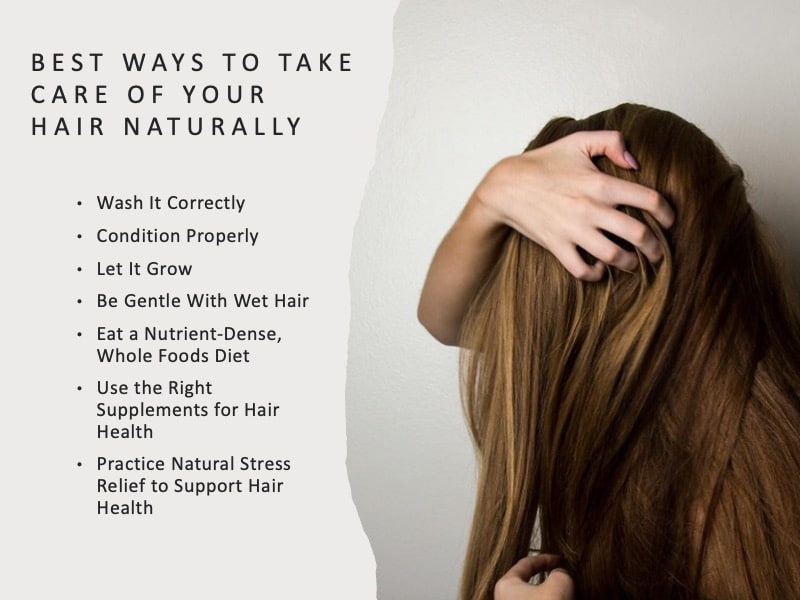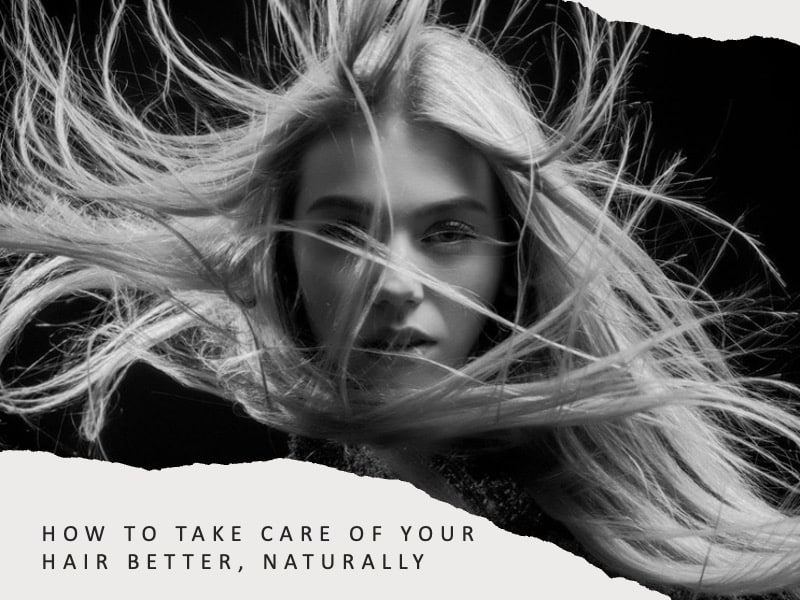How to Take Care of Your Hair Better, Naturally
Healthy hair isn’t just about aesthetics—it reflects your internal health, emotional well-being, and self-care practices.
For many people, the way their hair looks can affect their confidence, energy, and overall self-image.
However, taking care of your hair naturally is about more than surface-level beauty; it reflects a deeper commitment to your body’s wellness.
Therefore, taking better care of your care can help you build confidence and self-esteem, while also improving your overall health.
Before discussing how to take care of your hair, it’s important to understand what happens when you don’t.
Hair damage doesn’t occur overnight, but when you consistently skip key maintenance steps, the consequences can be long-lasting and difficult to reverse.
If you can use the tips on how to take care of your hair in this article, you should have a much better chance of having healthy-looking hair!
What Happens If You Don’t Take Care of Your Hair Correctly?
Neglecting your hair can result in a cascade of issues—many of which take time and effort to repair.
Excessive dryness, brittle strands, split ends, and breakage are often the first signs.
Over time, hair can become thin, dull, and lifeless.
In more severe cases, poor hair care can disrupt the hair growth cycle entirely, leading to thinning or hair loss.
Scalp health can also deteriorate, potentially causing dandruff, itchiness, or even infections due to buildup and clogged follicles.
These issues aren’t just cosmetic—they can signal internal imbalances such as nutritional deficiencies, hormonal disruption, or chronic inflammation.
Best Ways to Take Care of Your Hair Naturally

Once you understand what’s at stake, it becomes easier to commit to consistent, natural hair care practices.
The key is simplicity, consistency, and a holistic approach that nurtures your body from the inside out.
Wash It Correctly
Overwashing or using harsh shampoos can strip the scalp of its natural oils, leading to dryness and breakage.
Aim to wash your hair two to three times per week, depending on your hair type, texture, and activity level.
Use a sulfate-free shampoo, which helps maintain your scalp’s natural balance without damaging the protective barrier.
Washing with lukewarm water is gentler on your strands and helps prevent moisture loss.
Hot water might feel good at the moment, but it opens up the hair cuticle and accelerates damage over time.
Most of all, make sure that you are not shampooing it every day, as for most hair types a couple of times a week is generally sufficient, and any more than that can start to cause damage and breakage to the hair.
If you can wash your hair correctly, you should find that it makes a huge difference.
Condition Properly
Conditioner is essential for locking in moisture and smoothing the hair cuticle, helping you get healthy hair naturally.
Focus on the mid-lengths and ends of your hair, especially if you have oily roots.
Avoid applying conditioner to your scalp unless you are using a scalp-specific product.
Allow the conditioner to sit for at least a few minutes before rinsing—this gives your hair time to absorb its nutrients.
Too many people simply wash it out too quickly, before it has had a chance to do what it’s there to do.
For deeper nourishment, use a hydrating hair mask once a week, especially if your hair is exposed to heat styling or harsh weather.
Let It Grow
Sometimes, the best thing for your hair is simply to let it grow as well as you possibly can.
However, healthy hair growth takes time and consistent care.
Although regular trims might seem counterintuitive, they’re essential for removing split ends and preventing further breakage.
Even if you’re growing your hair long, trimming every 8–12 weeks will help it look fuller and more vibrant.
If you’re dealing with hair loss or thinning, natural treatments like minoxidil for hair regrowth may be helpful.
However, they work best when combined with a comprehensive wellness approach, including improved nutrition and stress reduction.
Be Gentle With Wet Hair
Hair is at its weakest when wet.
Tugging, brushing aggressively, or wrapping it in a heavy cotton towel can cause unnecessary breakage.
Instead, use a microfiber towel to blot and absorb water, or better yet—let your hair air-dry when possible.
If you need to detangle, use a wide-tooth comb and start from the ends, working your way up slowly.
This minimizes breakage and helps maintain hair integrity.
Eat a Nutrient-Dense, Whole Foods Diet
Hair is made of keratin—a type of protein—and requires a steady stream of nutrients to grow strong and healthy.
A well-balanced, whole-foods-based diet is one of the most powerful tools for improving hair from the inside out.
Key nutrients include:
- Protein: The building block of hair. Prioritize sources like eggs, legumes, fish, and lean meats.
- Iron & Zinc: Help carry oxygen to hair follicles and support hair repair. Found in spinach, lentils, pumpkin seeds, and grass-fed beef.
- Biotin (Vitamin B7): Essential for keratin production. Sources include eggs, nuts, sweet potatoes, and avocados.
- Omega-3 fatty acids: Support scalp health and hair density. Found in fatty fish, walnuts, chia seeds, and flaxseeds.
- Vitamin C: Enhances iron absorption and supports collagen production. Found in citrus fruits, strawberries, and bell peppers.
Dietary improvements won’t produce overnight results, but over time, they dramatically improve the strength, shine, and growth rate of your hair.
Use the Right Supplements for Hair Health
While food should be your primary source of nutrition, certain supplements can support natural hair care—especially when deficiencies or stress increase your body’s nutrient demands.
Multivitamins and Mineral Complexes
A high-quality supplement can fill in any gaps in your daily diet, particularly for micronutrients like zinc, iron, selenium, and biotin that directly impact hair health.
Using the right vitamin and mineral supplements can make a huge difference in the quality of your hair.
Collagen Peptides
Collagen contains amino acids like proline and glycine that are key for building hair proteins and maintaining follicle integrity.
Collagen supplements may improve hair strength and elasticity, especially in people over age 30 whose collagen production naturally declines.
Vital Proteins Collagen Peptides is an excellent collagen supplement that also contains additional vitamins, minerals, and hyaluronic acid to support healthy hair growth.
Colostrum Supplements
Bovine colostrum, rich in growth factors, immune-supporting compounds, and bioavailable nutrients, has been studied for its potential benefits in tissue repair and regeneration.
Some evidence suggests colostrum supplements may enhance scalp health and support stronger hair follicles through their anti-inflammatory and immune-modulating properties.
However, before starting any supplement, it’s wise to consult a healthcare professional or registered dietitian to ensure the product fits your personal health needs and won’t interact with any medications or conditions.
Practice Natural Stress Relief to Support Hair Health
Chronic stress can be one of the most overlooked causes of hair loss and poor hair quality.
Elevated stress hormones—especially cortisol—can disrupt the hair growth cycle, pushing more follicles into the “telogen” or resting phase, which leads to excessive shedding.
This is known as telogen effluvium, and it often appears a few months after a stressful event or prolonged period of emotional strain.
Stress also indirectly harms your hair by increasing inflammation, reducing nutrient absorption, and negatively impacting sleep—all of which are essential for healthy hair regeneration.
Incorporating natural stress relief techniques into your daily routine helps restore hormonal balance and create the internal environment necessary for strong, vibrant hair.
Some proven methods include:
- Daily prayer or mindfulness meditation: Daily prayer and meditation practices reduce anxiety and lower cortisol levels, helping the body shift into a restorative state.
- Regular physical activity: Low- to moderate-intensity movement, such as walking, mobility exercises, swimming, or light resistance training, supports mental clarity and improves circulation to the scalp.
- Spending time in nature: Being outdoors helps recalibrate your nervous system and promotes a sense of calm that counteracts daily stressors.
- Deep breathing exercises: Techniques like diaphragmatic breathing or box breathing activate the parasympathetic nervous system and help reduce cortisol levels quickly.
- Limiting caffeine and alcohol: Both substances can increase anxiety and disrupt sleep, which further contributes to hair loss under stress.
Making stress relief a daily priority isn’t just good for your mind—it’s essential for maintaining healthy hair and preventing unnecessary damage caused by internal tension.
Final Thoughts: How to Take Care of Your Hair Naturally
Caring for your hair naturally isn’t about following trends or buying into hype—it’s about honoring your body from the inside out.
By adopting consistent habits like gentle washing, proper conditioning, nutrient-dense eating, natural supplementation, and stress reduction, you create a strong foundation for lasting hair health.
There’s no one-size-fits-all solution, but small, intentional changes add up.
When your internal health is in balance, your hair becomes one of the most visible signs of vitality, resilience, and well-being.
Treat your hair with patience, listen to what it needs, and nourish it with both care and intention—because natural hair care is self-care.



